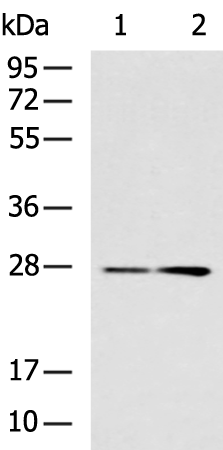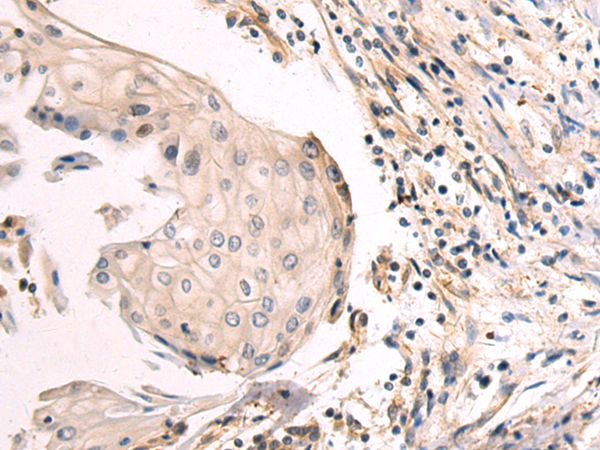

| WB | 咨询技术 | Human,Mouse,Rat |
| IF | 咨询技术 | Human,Mouse,Rat |
| IHC | 1/50-1/200 | Human,Mouse,Rat |
| ICC | 技术咨询 | Human,Mouse,Rat |
| FCM | 咨询技术 | Human,Mouse,Rat |
| Elisa | 1/5000-1/10000 | Human,Mouse,Rat |
| Aliases | TSG |
| WB Predicted band size | 25 kDa |
| Host/Isotype | Rabbit IgG |
| Antibody Type | Primary antibody |
| Storage | Store at 4°C short term. Aliquot and store at -20°C long term. Avoid freeze/thaw cycles. |
| Species Reactivity | Human, Mouse, Rat |
| Immunogen | Fusion protein of human TWSG1 |
| Formulation | Purified antibody in PBS with 0.05% sodium azide and 50% glycerol. |
+ +
以下是关于TWSG1抗体的3篇示例文献(内容为示例,建议通过学术数据库验证具体信息):
---
1. **文献名称**: *TWSG1 modulates BMP signaling in osteoblast differentiation*
**作者**: Smith A, et al.
**摘要**: 研究通过TWSG1抗体检测其在成骨细胞中的表达,发现TWSG1通过调控BMP/Smad通路抑制骨形成,提示其在骨质疏松中的作用。
2. **文献名称**: *TWSG1 as a biomarker in colorectal cancer progression*
**作者**: Chen L, et al.
**摘要**: 利用TWSG1抗体进行免疫组化分析,发现TWSG1在结直肠癌中高表达,且与转移和不良预后相关,可能成为治疗靶点。
3. **文献名称**: *TWSG1 antibody-based detection in developmental disorders*
**作者**: Garcia R, et al.
**摘要**: 开发了高特异性TWSG1抗体,验证其在胚胎发育模型中的表达模式,证明TWSG1缺失导致神经管闭合缺陷。
---
建议通过 **PubMed** 或 **Google Scholar** 搜索关键词 "TWSG1 antibody" 获取最新文献。
TWSG1 (Twisted Gastrulation BMP Signaling Modulator 1) is a secreted glycoprotein belonging to the twisted gastrulation (TSG) family, initially identified for its role in embryonic development. It functions as an extracellular modulator of bone morphogenetic protein (BMP) signaling pathways, which are critical for skeletal formation, tissue homeostasis, and cellular differentiation. TWSG1 interacts with BMP ligands (e.g., BMP2. BMP4) and their antagonists (e.g., Chordin, Noggin), fine-tuning BMP activity in a context-dependent manner. This regulation influences osteoblast/osteoclast balance, hematopoiesis, and angiogenesis, linking TWSG1 to bone metabolism, cancer progression, and blood disorders.
TWSG1 antibodies are immunological tools designed to detect, quantify, or neutralize TWSG1 protein in research and clinical applications. Polyclonal or monoclonal antibodies target specific epitopes, enabling applications such as Western blotting, immunohistochemistry, flow cytometry, and ELISA. In research, these antibodies help elucidate TWSG1's dual roles in disease: it may act as a tumor suppressor by inhibiting BMP-driven oncogenesis or as a pro-tumor factor by promoting angiogenesis or immune evasion. Clinically, TWSG1 antibodies are explored for therapeutic potential in osteolytic disorders (e.g., osteoporosis) and cancers (e.g., multiple myeloma, breast cancer) where dysregulated BMP signaling contributes to pathogenesis. Challenges include understanding tissue-specific interactions and optimizing antibody specificity to minimize off-target effects.
×